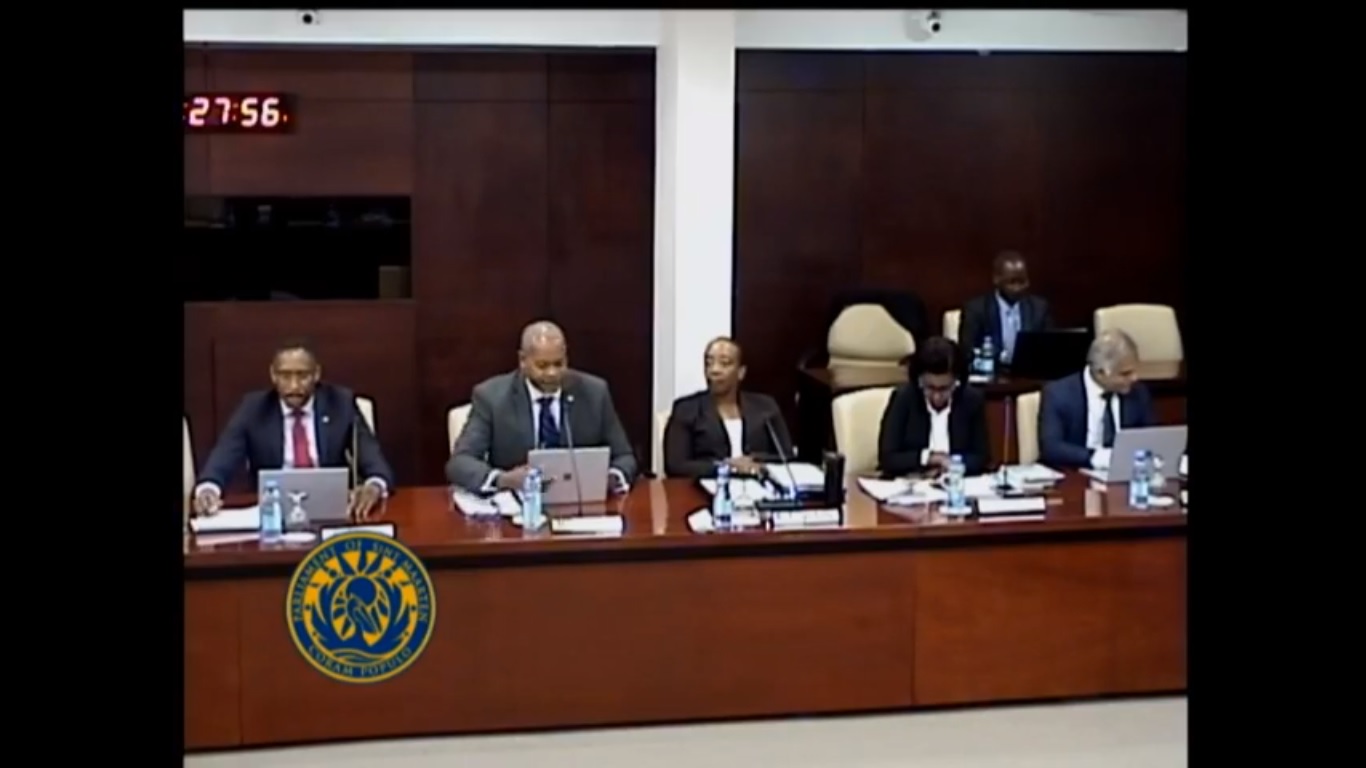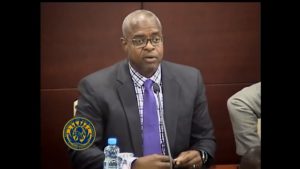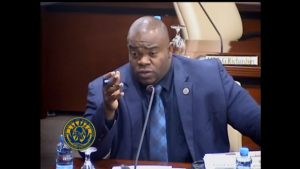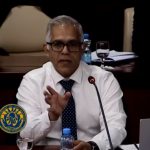
PHILIPSBURG – National Alliance MP Christophe Emmanuel and United Democrats MP Franklin Meyers are not in favor of a national ordinance that aims to regulate the fight against money laundering and the financing of terrorism. “I cannot support this,” Meyers said in a central committee meeting on Thursday. MP Sarah Wescot-Williams, who chaired the meeting, expressed concerns about the government’s intention to skip the review of the legislation by the office of the Ombudsman. The deadline for approving the legislation is March 27.
 Ligia Stella, director of the Financial Intelligence Unit (MOT – Meldpunt Ongebruikelijke Transacties) outlined the draft law to members of the central committee. “The government wants to make sure that St. Maarten is compliant with the recommendations of the Financial Action Task Force (FATF),” she said.
Ligia Stella, director of the Financial Intelligence Unit (MOT – Meldpunt Ongebruikelijke Transacties) outlined the draft law to members of the central committee. “The government wants to make sure that St. Maarten is compliant with the recommendations of the Financial Action Task Force (FATF),” she said.
While there are just 195 countries in the world, 205 jurisdictions have subscribed to the FATF-recommendations. The draft law merges the one on reporting unusual transactions with the one that regulates identification requirements for the providers of financial services.
The identification ordinance obliges financial service providers to do their due diligence before accepting a client.
Through its recommendations – and countries’ level of compliance – the FATF identifies high-risk and non-cooperative countries on a black or gray list. Three times a year the organization publishes a list of countries that have insufficiently implemented its recommendations. It also expects its member states (St. Maarten is one of them) to take adequate measures to mitigate the risks associated with such countries.
Stella said that it is “crucial to protect the channels through which the money laundering process can take place against abuse for criminal purposes.” This approach requires a transparent financial system, the performance of thorough customer due diligence and the reporting of unusual transactions.
The identification ordinance and the ordinance that regulates unusual financial transactions initially targeted only financial institutions. But the now proposed legislation extends the scope to money remitters, stock exchanges, brokers and non-financial service providers like casinos, lotteries, jewelers, car dealers and independent professionals like tax advisors and notaries.
 MP Franklin Meyers notes that “it is wrong to assume automatically that businesses like lotteries and casinos are criminal. The government issues licenses to these companies and then the banks can say: we don’t want to do business with them? With these measures you are putting people in a position where it is impossible to do business.”
MP Franklin Meyers notes that “it is wrong to assume automatically that businesses like lotteries and casinos are criminal. The government issues licenses to these companies and then the banks can say: we don’t want to do business with them? With these measures you are putting people in a position where it is impossible to do business.”
If casinos on the island had to close because banks don’t want them as customer anymore, it would put 500 people out of a job, Meyers pointed out.
Just this week Robbie dos Santos, owner of Robbie’s Lottery, filed a lawsuit against Maduro and Curiel’s Bank in Curacao and the Windward Islands Bank in St. Maarten, because the banks want to cancel his business and personal accounts. According to his attorney, this would make it impossible for Dos Santos to do business; 200 jobs are on the line.
 MP Christophe Emmanuel brought this to the attention of the central committee.
MP Christophe Emmanuel brought this to the attention of the central committee.
The banks want to get rid of Dos Santos because his activities are considered too high of a risk. This could jeopardize correspondent banking services.
In 2013, RBC Bank (Royal Bank of Canada) attempted to close down the accounts of casino owner Francesco Corallo. That attempt failed, because Corallo was unable to find another financial service provider in St. Maarten to accept his business.
Minister Cornelius de Weever (Justice) told the central committee that banks do their own risk management and decide who they want as their customers.
MP Meyers emphasized that businesses like casinos and ‘houses of ill repute’ are legal in St. Maarten. “Those who write the laws have committed more atrocities than those who break them,” he declared, adding: “I cannot support this.”
Later Meyers said that he would present an amendment to the law during its handling in the upcoming public meeting of parliament.
MP Emmanuel wondered what the legislation would do to cash-based businesses like lotteries and casinos. “How does this legislation affect these companies?”
 Vidjai Jusia, head of the Justice Affairs Department, said that “the country will be affected by not living up to the requirements of the financial Actions Task Force.” He also noted, addressing MP Wescot-Williams’ concerns about skipping review of the legislation by the Ombudsman, that the constitution provides a provision that allows this.
Vidjai Jusia, head of the Justice Affairs Department, said that “the country will be affected by not living up to the requirements of the financial Actions Task Force.” He also noted, addressing MP Wescot-Williams’ concerns about skipping review of the legislation by the Ombudsman, that the constitution provides a provision that allows this.
MP Emmanuel was not satisfied with the answers he received and announced that he would not vote in favor of the legislation.
###
Related articles:
Resistance against money laundering ordinance
Politically Exposed Persons in the crosshairs of money laundering legislation (Please log in to read)
Opinion: “An interesting debate”
De-risking strategy targets casinos and lottery companies (Premium Article)
Opinion: “Invisible money” (Premium Article)









